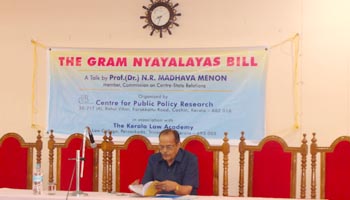Talk by renowned jurist N.R Madhava Menon on Gram Nyayalaya Bill was conducted on 8th February 2009 at Kerala Law Academy, Thiruvananthapuram. The concept of Gram Nyayalaya has been a debated issue for a long time and effort to bring the concept to help the rural people was delayed for a long time. The present Bill is a welcome relief to those sections of the society who have been deprived and been suffering from injustice or delayed justice. Dr N.R Madhavamenon who is aptly called the father of Nation law Schools also deserve the rare distinction of been the pioneer of the masses for having brought out the concept of Gram Nyayalaya. He had given his service to the Committee under Justice V.R Krishna Iyer which discussed the issues affecting harijans, women, poor and needy. He brought into light the caste system which was prevalent in India, which was according to him a cause for severe injustice to the people. If any problem has to be provided solution for, it has to be tackled no doubt but at the grass root level. So the question which he addresses was how to bring justice to the poor and needy and this problem also has to be tackled at grassroots levels. He mentioned the concept of ‘barefoot lawyers’ who was more of a social worker. The need for grassroot initiatives in the form of Gram Nyayalayas had been emphasized by many Committes but which fell into deaf ears. Even the present Bill have not been notified in the Official Gazzette, inspite of the fact that 6000 Gram Nyayalayas is proposed to be built under the Bill.
He then discussed the important provisions of the Bill which made it unique and can bring a drastic change in the justice delivery systems for the rural people. Under the Bill, the people can directly approach the Nyaydhikari appointed under the same. There is no court fees to be paid, no adjournments to be called and most importantly no lawyers are needed. According to him, the profession has undergone a serious and drastic change owing to exploitation of ordinary people. The Bill has been enacted to stop this and secure justice to the poor and needy which would be a revolutionary step.
Sections 11 to 17 of the Bill which lists out the offences, civil and criminal, over which the Nyayadhikari has territorial jurisdiction is flexible. The state government can add more cases into this list when it thought so. It can even have multiple jurisdictions and High Courts of each state can decide about the extent of financial jurisdiction. Other unique features include the non application of Evidence Act, application of natural justice principles and with no court fees or adjournments. The trendsetting provisions of the Bill indentify itself with a conciliatory approach to justice as opposed to adversarial. A strict adherence to law is not required in such a court which depends on the facts and circumstances of the case. Dr Madhava Menon emphasized that that the object of the Bill is to unite people and not divide them. He concluded that the Bill is a very practical approach to justice with much needed emphasis on the rural people. He was sure that lawyers will oppose it, but the people in the rural will take it up which would eventually be successful institution of justice.
|
